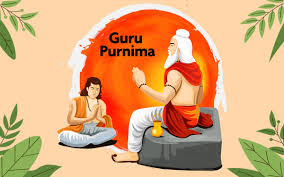
Guru Purnima is an important festival celebrated in India, dedicated to the worship of gurus or spiritual teachers. It is observed on the full moon day (Purnima) in the Ashadha month (usually June or July). This day is a mark of reverence and gratitude towards gurus, who play an essential role in guiding individuals on the path of knowledge, wisdom, and spiritual enlightenment. Guru Purnima is observed by devotees of various spiritual traditions, particularly by followers of Sanatan Dharma, Buddhism, and Jainism.
Significance of Guru Purnima:
Guru Purnima is significant because it is believed to be the day when Lord Shiva, the original Guru, imparted knowledge of yoga and spiritual wisdom to his first disciples, the Saptarishis. In modern times, the day is used to honor the spiritual guides, teachers, and mentors who impart wisdom in various forms – be it in education, spirituality, or personal growth. The word “Guru” is derived from “Gu” meaning darkness and “Ru” meaning light, symbolizing the Guru’s ability to dispell ignorance and lead the disciple toward the light of knowledge.
Rituals and Offerings:
- Preparation: Devotees clean their homes and temples, set up an altar with pictures or statues of their Guru or spiritual teacher, and decorate the space with flowers and fruits.
- Worship of the Guru: The Puja begins with chanting mantras such as “Guru Brahma, Guru Vishnu, Guru Devo Maheshwara,” invoking the divine presence of the Guru. Devotees offer flowers, incense sticks, and fruits at the feet of the Guru’s image or idol. Tulsi leaves are also considered auspicious for Guru worship.
- Guru Stotra and Bhajans: Devotees chant Guru Stotra or Guru Vandana to express gratitude and devotion. They also sing bhajans and kirtans that praise the Guru’s teachings.
- Fasting and Prayers: Some devotees observe a partial fast, especially those who consider their Guru as a divine entity. They offer prayers for guidance, protection, and blessings in their spiritual journey.
- Charity and Service: As an expression of gratitude, it is customary to serve others or engage in charity on this day, offering food or donations to the needy. This symbolizes the Guru’s teaching of compassion and selfless service.
- Concluding Rituals: The puja is concluded by seeking blessings from the Guru for wisdom, peace, and success in life. Prasadam (blessed food) is then distributed among family and devotees.
Guru Purnima is a day to reflect on the invaluable contributions of the Guru in one’s life, expressing gratitude for their teachings and seeking further guidance on the path to spiritual and worldly success.

